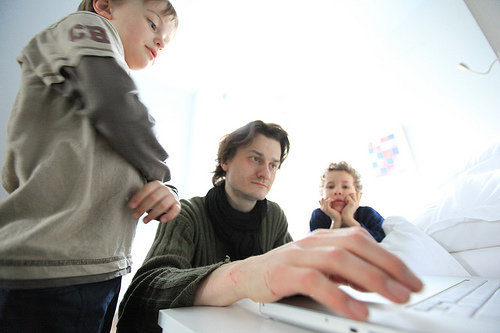But even before addressing those questions, should schools even be involved in this conversation? Is this an issue for each family to sort out among themselves? One of the reverberating effects of online life is the fluidity of the connection between different environments, and with an instance like this, school and home become inextricably tied. Off-campus activity plays out on-campus, at recess, in the lunchroom and on the bus. Word travels quickly, both verbally and through texts and emails, and some schools prefer to become a part of the conversation in order to help parents and kids build a safe community, online and offline.
PASSWORD PRIVACY AND SAFETY CONCERNS
When it comes to deciding about kids and parents sharing their passwords, the most important goal is to maintain open communication, explaining to kids the responsibility that comes along with having an email account, and the need to ask an adult for help if the child feels uncomfortable with the nature of any online exchange. It's a big responsibility, though, and changes with a kid's age. Is it too much to ask of a 10- or 11-year old to know what's worthy of alarm?
Some kids and parents decide the parent can have email access, but as kids get older and want more independence and privacy, those agreements may change. Some parents and kids agree to keep kids' password in a sealed enveloped, promising only to open the seal when there's a question of safety. Others figure out an arrangement with a parent's close friend or relative with sound judgment who has emergency access to the email. The goal is to let kids know they're not alone.
Whether kids under 13 are ready for open social media sites like Zorpia is another thorny issue. Zorpia has more than 24 million users, and a large international community, which could provide a great way for kids to interact with other kids from across the world. But reviews of the site mention plenty of criticism about unsolicited and inappropriate messaging when its privacy settings blocking strangers are not in place.
Bottom line: Kids are curious. They hear about a new site or tool and they want to find out what it's all is about. It can be exciting and enticing to enter into a social network, and it's important to acknowledge that interest with kids. Facebook is flooded with millions of under-13 users and kids are going to want to explore social networking.
But rather than instill unnecessary fear of stranger danger, when talking with kids about privacy, anonymity and creating online identities, a few questions to ask:
- How would you respond if a stranger tried to contact you through a social media site?
- What would you do if you found out that one of your friends was talking to random strangers?
- When would you go to an adult for help if something uncomfortable happened?
- Why are you interested in social media sites?
- Where do you find out about them? What do you friends say?
Matt Levinson is the Head of the Upper Division at Marin Country Day School in Corte Madera, Calif. and the author of From Fear to Facebook: One School’s Journey.


